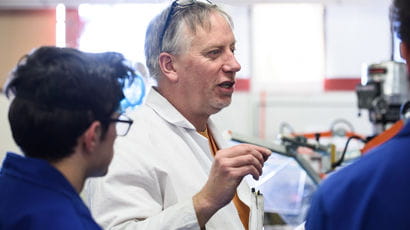UWE Bristol researcher discovers identity of mystery figure on Led Zeppelin IV cover

A grey beard underlining his weathered face, the figure stoops whilst apparently pausing for the photographer, his leathery hands grasp the pole supporting the bundle of hazel on his back.
The framed colour image of an elderly man carrying a large bundle of sticks on his back will be recognised worldwide. It is the centrepiece of the iconic front cover of Led Zeppelin IV which famously features no words.
The origin of the central figure has remained a mystery for over half a century. It can now be revealed as a late Victorian coloured photograph of a Wiltshire thatcher.
The original of the photograph made famous by the band was recently discovered in a late Victorian photograph album. The discovery was made by Brian Edwards, a Visiting Research Fellow with the Regional History Centre at the University of the West of England.
This photograph is now in Wiltshire Museum in Devizes. An exhibition featuring the image, along with others taken in the West of England during the Victorian era, is scheduled to be held at the museum in spring 2024.
Released 52 years ago today (November 8, 1971), Led Zeppelin IV has sold more than 37 million copies worldwide. The album’s cover artwork was radically absent of any indication of the musicians or a title. The framed image, often been referred to as a painting, is understood to have been discovered by the band’s lead singer Robert Plant in an antique shop near guitarist Jimmy Page’s house in Pangbourne, Berkshire. Closer inspection reveals this framed image was a coloured photograph, the whereabouts of which is now unknown.
The black and white original Victorian photograph was discovered during ongoing research extending from the Ways of Seeing Wiltshire exhibition (20 May 2021 to 30 August 2021), which was curated by Brian Edwards in partnership with Wiltshire Museum. From paintings to photographs and artefacts to memories, Edwards’ research involved monitoring everyday sources that stimulates public engagement with Wiltshire’s past. While following up on some early photographs of Stonehenge, Edwards came across the Victorian photograph Led Zeppelin made familiar over half a century ago.
Featuring exceptional photographs from Wiltshire, Dorset and Somerset, the Victorian photograph album contained over 100 architectural views and street scenes together with a few portraits of rural workers. Most of the photographs are titled and beneath the photograph made famous by Led Zeppelin the photographer has written ‘A Wiltshire Thatcher’. The Victorian photograph album is titled ‘Reminiscences of a visit to Shaftesbury. Whitsuntide 1892. A present to Auntie from Ernest.’
Brian Edwards said: “Led Zeppelin created the soundtrack that has accompanied me since my teenage years, so I really hope the discovery of this Victorian photograph pleases and entertains Robert, Jimmy, and John Paul.”

A part signature matching the writing in the album suggests the photographer is Ernest Howard Farmer (1856-1944), the first head of the School of Photography at the then newly renamed Polytechnic Regent Street. Now part of the University of Westminster, Farmer had worked in the same building as the instructor of photography since 1882, when it was then known as the Polytechnic Young Men’s Christian Institute.
Further research suggests the thatcher captured in the image is Lot Long (sometimes Longyear), who was born in Mere in 1823 and died in 1893. At the time the photograph was taken, Lot was a widower living in a small cottage in Shaftesbury Road, Mere.
David Dawson, Director of Wiltshire Museum, said: “This exhibition will be a celebration of the work Ernest Farmer, who today is little-known but was a leading figure in the development of photography as an art form. Through the exhibition, we will show how Farmer captured the spirit of people, villages and landscapes of Wiltshire and Dorset that were so much of a contrast to his life in London. It is fascinating to see how this theme of rural and urban contrasts was developed by Led Zeppelin and became the focus for this iconic album cover 70 years later.”
Related news

18 December 2025
UWE Bristol professor appointed National Institute for Health and Care Excellence CEO
Jonathan Benger CBE, Professor of Emergency Care at UWE Bristol, has been appointed as the new chief executive officer of the National Institute for Health and Care Excellence (NICE).

17 December 2025
Findings revealed from first UK study into experiences of mothers who are survivors of rape pregnancy
UWE Bristol academics have revealed the findings of the first UK-based study of the experiences of mothers who are survivors of rape pregnancy.

11 December 2025
Social media influencer work is far more demanding than it looks, research finds
A study exploring the mental health impacts of social media influencer work has revealed that life online is far more demanding than it appears.

25 November 2025
UWE Bristol experts join film Q&A exploring music and melodrama
Academics will take part in the Cary Comes Home Festival, with a post-screening Q&A exploring music, melodrama and emotional storytelling in classic cinema.

17 November 2025
Urgent reform needed to support ambulance-delivered end of life care, study finds
More than three quarters (78 per cent) of paramedics sometimes fear doing the wrong thing when caring for people in the last year of life, new research has found.

13 November 2025
Bristol’s screen industry experiences “boom-and-bust cycle” after post-pandemic recovery, new research from UWE Bristol finds
New research from UWE Bristol provides detailed insight into Bristol's screen sector.

13 November 2025
New AI research to revolutionise animal welfare
A UWE Bristol research project will combine behavioural science and AI to create technology that understands not only what animals do, but how they feel.

10 November 2025
Lessons from Low Traffic Neighbourhoods will drive better public engagement, study finds
Lessons from Low Traffic Neighbourhoods have informed a new toolkit to improve engagement with the public on challenging local street issues.

06 November 2025
First-of-its-kind study aims to help more people spend their final days at home
A new study will explore how architectural design could support end-of-life care in domestic settings.

29 October 2025
UWE Bristol academic unveils breakthrough in energy-efficient AI at NATO science forum
Dr Jonathan Lancelot has developed a new form of AI that could transform how intelligent machines operate in space, defence, and remote environments.

15 October 2025
UK food needs radical transformation on scale not seen since Second World War, new report finds
A new report from the Agri-Food for Net Zero Network+ finds urgent action on food is needed if the UK is to reboot its flagging economy, save the NHS billions, ensure national food security, and meet climate commitments.

07 October 2025
Academic playing role in project to find hidden graves in Mexico using drone technology
A UWE Bristol lecturer is playing a part in a project using drone technology to locate concealed graves in Mexico.
You may also be interested in

Media enquiries
Enquiries related to news releases and press and contacts for the media team.

Find an expert
Media contacts are invited to check out the vast range of subjects where UWE Bristol can offer up expert commentary.

Regional History Centre (RHC)
The Regional History Centre promotes research into the history of Britain's South Western counties.






